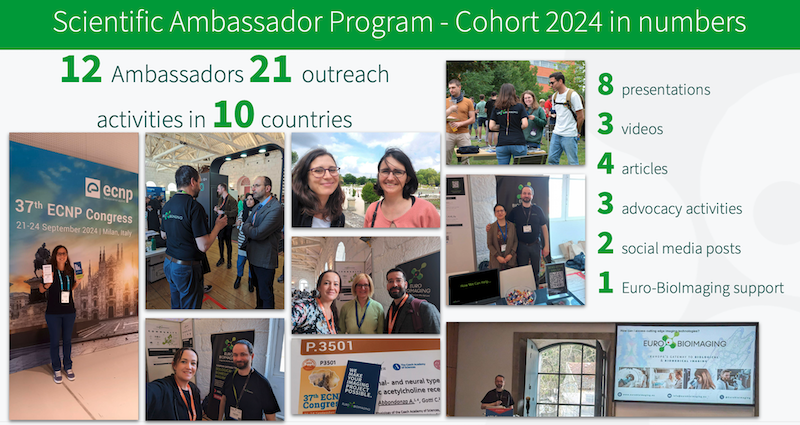
Baubak Bajoghli, Austrian BioImaging/CMI Director, on the importance of open access infrastructures
Baubak Bajoghli joined Euro-BioImaging as Director of Austrian BioImaging/CMI in 2022. He also represents Austria on the Euro-BioImaging Board. He was recently interviewed by EMBLetc magazine, where he shared his personal experience as a researcher benefitting from open access to imaging facilities and explained how Austrian BioImaging/CMI and similar consortia can support researchers. He also provided reflections on the impact of Euro-BioImaging and other research infrastructures on the progress of life sciences research. Below are some excerpts from the interview.
Read the full interview article to learn more about Baubak’s scientific background, his passion for imaging and the choices that led him to embark on a career in infrastructure management.
How can open access to imaging infrastructures support life sciences research?
“My own experiences have made me acutely aware that many scientists have outstanding research projects but struggle to conduct experiments properly due to a lack of equipment, expertise, or resources at their host institutions. On the other hand, I understand that it’s not economically feasible for institutions to invest in every expensive instrument their employees might temporarily need. In my opinion, the most effective solution to this problem is taking advantage of pan-European consortia of research infrastructures that offer access to cutting-edge technologies for all researchers, regardless of their institutional affiliations.”
Can you tell us a bit more about Austrian BioImaging/CMI and how consortia like these can help researchers?
“Austrian BioImaging/CMI is one such consortium at the national level, consisting of eight Austrian universities and leading research institutions. We enable researchers to access over 40 imaging technologies for biological and preclinical research, and as a node, we strongly cooperate with Euro-BioImaging, which is a European Research Infrastructure Consortium (ERIC) member.”
“During my 18 months in office, I’ve been committed to ensuring that researchers don’t face the same challenges I did. To me, open access to research infrastructures should be a pillar of open science in European policy. I don’t tire of communicating with researchers, heads of universities and funding bodies, and Austrian policymakers to raise their awareness about the key role of state-of-the-art research infrastructures in generating knowledge breakthroughs and new discoveries, and why their sustainability is so important. It appears that the European Commission also recognises their importance.”
“Currently, there are several Horizon Europe programs that financially support researchers’ access to high-quality resources, including biological and biomedical imaging technologies. I really recommend that researchers always keep themselves well-informed so that they can make the maximum use of the available resources for their projects. Since there are numerous options available, Austrian Bioimaging/CMI and Euro-Bioimaging also provide consulting services for researchers.”

In your opinion, how do initiatives like Euro-Bioimaging and Austrian Bioimaging influence the way biological research is done in European countries (and globally)?
“To strengthen our competitiveness in global research, specific attention should be given to national and European research infrastructures consortia. To me, their socio-economic impact is unquestionably high. In today’s rapidly evolving technological landscape, access to cutting-edge technologies and services is crucial for performing outstanding research. However, building and maintaining cutting-edge research infrastructures can be expensive and by sharing these costs, individual institutes and countries can reduce the financial burden, making research more economically sustainable in Europe.”
“Additionally, European research infrastructure consortia such as Euro-BioImaging have the potential to act as incubators for innovation and technology transfer. In Austrian BioImaging/CMI, 40% of our technology units consist of research groups specialising in various imaging modalities, and developing tools for biological research or medical diagnostics.”
“It’s important to note that we are just one of 35 nodes within Euro-BioImaging. So, there is a huge potential for cooperation between 173 imaging facilities and research groups from 16 countries and EMBL associated with Euro-BioImaging, as well as with the private sector, to drive innovation and address future research needs. Solutions for open bioimaging data, common standards and best practices for biological and medical imaging can only be achieved at the pan-European level.”
“Last but not least, research infrastructure consortia must cooperate to enhance their visibility because we can only attract top talent when we can provide access to cutting-edge research infrastructures in Europe, which in the long run, will also bring financial benefits.”
These extracts are part of a longer article written by Shreya Ghosh for the EMBLetc. magazine (Issue 101, article published on November 15). Read the full interview article here.
More news from Euro-BioImaging


